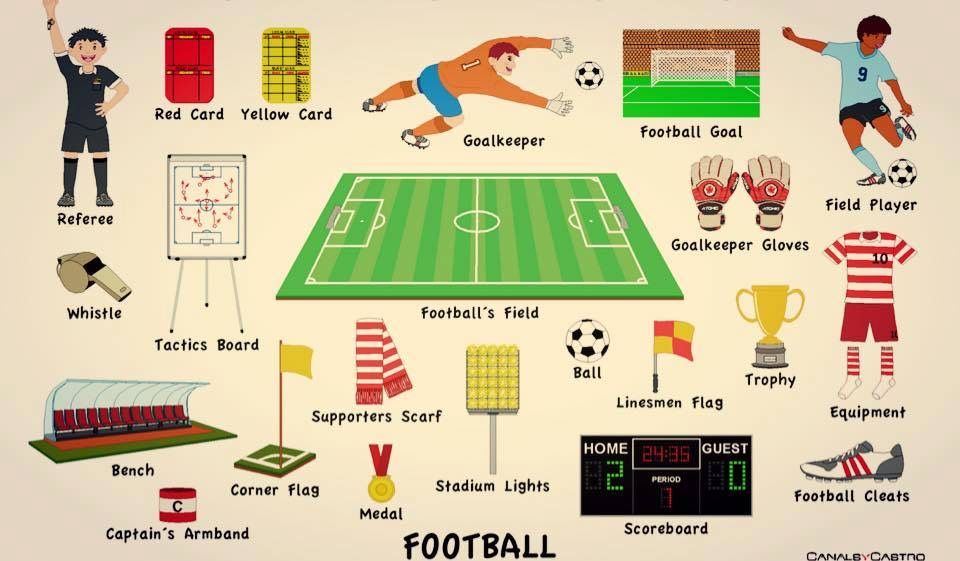These are just a few slang And Terminology used in the soccer, and Goal has crafted a handy guide for common slang.
Whether you refer to it as soccer or football, being familiar with the language of this beautiful game can facilitate connections with other English speakers, colleagues, and friends.
Whether you engage in soccer as a recreational activity after work, find joy in it as a enjoyable form of exercise, or simply relish watching matches in a bar, understanding soccer terminology is essential for a complete appreciation of the sport.
This guide will impart all the necessary words and phrases for you to actively participate in soccer discussions. From fundamental terms such as “penalty kick” to more advanced concepts like “offside,” we will cover the entire spectrum. By the conclusion, you’ll be adept at discussing soccer with confidence, just like a seasoned pro.
What is your English level?
Find out your A1 A2 B1 B2 C1 C2 level of English with our quick, free online test.
Basic soccer terms
For those unfamiliar with the sport, it’s essential to start by acquainting yourself with the fundamental soccer terminology employed to narrate the events of a match. Master these standard definitions, and you’ll gain a clear understanding of the unfolding action.
Soccer pitch terms
To begin, let’s examine the arrangement of the soccer game and the terminology utilized to describe the playing field:
- Penalty area
- Penalty spot
- Sideline/Touch line
- Center spot
- Goal
- Goal line
- Sideline/Touch line
- Corners
- 6-Yard box

Soccer positions
In soccer, team members assume various roles and positions. Here’s the essential vocabulary you should familiarize yourself with:
- Goalkeeper
- Midfielder
- Defenders
- Starting 11
- Forward/Striker
Are you C1 Advanced English?
Get your C1 Advanced English certificate now!
✓ Add your certificate to your resume
⭐ ⭐ ⭐ ⭐ ⭐
Soccer verbs and actions
While soccer might appear as primarily involving running and kicking, there are distinct terms to characterize the actions players take on the field. Some of these might share similarities with everyday verbs in English, but their meanings differ slightly in the context of soccer.
- Corner – Awarded when the defending team kicks the ball out of bounds over their own goal line, a corner allows the attacking team to restart play with a kick from the corner area.
- Save – A save happens when the goalkeeper prevents the ball from entering the goal.
- Assist – An assist occurs when a player contributes to a goal by providing a pass or setting up an opportunity for a teammate to score.
- Defending – Defending, with a similar meaning in regular English, is when players collaborate to thwart the opposing team from scoring. Defenders employ tactics like blocking shots, intercepting passes, and making tackles to keep the ball away from their goal.
- Goal – Achieving a goal is the ultimate accomplishment in soccer, happening when the ball crosses the goal line within the goalposts and under the crossbar, earning a point for the team.
- Dribbling – Dribbling involves skillfully maneuvering the ball with one’s feet, akin to a dance. Players use quick touches and footwork to navigate past opponents, retaining control of the ball.
- Passing – In soccer, passing aligns closely with its everyday English usage. It entails a player kicking or rolling the ball to a teammate, facilitating ball movement, creating scoring opportunities, and maintaining possession.
- Shooting – Contrary to firearms, shooting in soccer refers to a player kicking the ball towards the goal with the aim of scoring.
- Header – True to its name, a header is when a player strikes the ball using their head, commonly employed during aerial challenges.
Soccer terms from around the world
Football is a global sport, and every nation has its distinct term for the game. If you aim to communicate with international friends or fellow students in your business English course, familiarizing yourself with these prevalent soccer terms could prove beneficial.
- Football
- Futbol
- Calcio
- Futebol
- Voetbal

Slang soccer terms
Eager to immerse yourself in Soccer Twitter or dive into autobiographies penned by renowned soccer players? Before you do, it’s essential to familiarize yourself with some soccer slang terms. While there are numerous expressions out there, here are a few common ones to kickstart your understanding. Using these with your soccer enthusiast friends might earn you some extra points.
Nutmeg – Execute a slick move by passing the ball between your opponent’s legs, repossessing it on the other side, and you’ve just pulled off a ‘nutmeg.’ This cheeky maneuver not only humiliates the defender but also brings joy to the attacker.
Park the bus – This term refers to a defensive strategy where a team concentrates on maintaining a robust defense, positioning many players deep in their own half. The goal is to frustrate the opposing team’s attack by creating an impenetrable barrier.
Panenka – Named after Czech player Antonín Panenka, the Panenka is a penalty kick technique that delicately chips the ball straight down the middle while the goalkeeper dives to either side.
Rabona – A flashy move where the player wraps one leg around the back of the other to strike the ball, often employed to surprise opponents or deliver a stylish shot.
Scissor kick – An acrobatic move where a player jumps into the air sideways and strikes the ball mid-air.
Bicycle kick – Another acrobatic technique, often used when a player needs to kick a ball above head height.
These distinctive soccer terms highlight the innovative and artistic nature of the game. From the audacious Panenka to the flamboyant Rabona, the language of soccer continually evolves.
In a similar vein, learning soccer terms parallels acquiring business English. Much like seeking a business English tutor who stays abreast of industry trends, learning from a true soccer fan ensures your knowledge remains current and vibrant.
What is your English level?
Find out your A1 A2 B1 B2 C1 C2 level of English with our quick, free online test.





